A father and son duo from Leicester scammed drivers out of more than £60,000 by selling worthless car insurance policies that left dozens of drivers uninsured.
Ilyas Rauf charged unsuspecting customers up to £300 for invalid policies, which left drivers facing potential fines and vehicle seizures, while secretly sharing thousands of pounds with his son Amer Ilyas.
The scams, known as ‘ghost broking’ are often advertised on social media, promising cheap quotes for a car insurance policy.
In the scam, bogus insurance middlemen will claim they can get you car or home insurance as a discount.
They may either hand over a fake policy or a genuine one, which they subsequently cancel to keep the refund for themselves.
Alternatively, they take out a real policy with incorrect information to bring the premium down – which would likely leave it void should you try to make a claim.
Rauf, 51, made £61,763 from August 2016 to January 2020 by providing forged employment letters to secure discounted premiums for his victims.
Between September 2019 and June 2020, he shared more than £11,000 of his profits with his 28-year-old son, who was given the job of recruiting victims through social media.
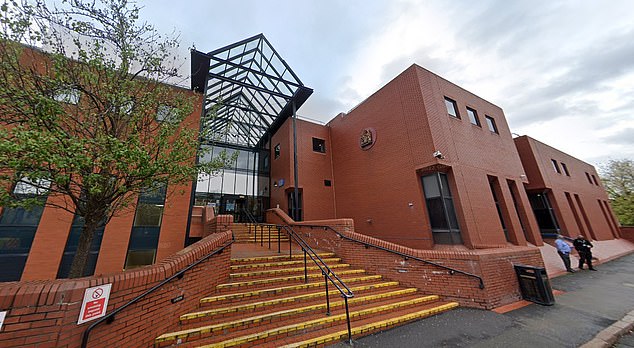
The father and son were sentenced at Leicester Crown Court for fraud offences

The National Crime Agency previously shared a series of mocked-up Instagram ads offering ‘100% legit insurance guaranteed to beat any price’ to show drivers what to look out for
An investigation found he used letters from a company called Eastern Catering to fraudulently obtain no claims discounts.
He falsely claimed his clients had worked for the company for multiple years without crashes or insurance claims.
It was later discovered that the address Eastern Catering was registered to was the same used by Rauf to sell the fake policies.
Police found that his son had also messaged 31 contacts about insurance on his phone between October 2015 to March 2021, often telling customers that his father would provide quotes for them the next day.
Amer Ilyas would then tell victims to visit the office or send photos of bank cards for processing of payment.
Rauf was linked to 52 fraudulent motor insurance policies across four different insurers.
Ilyas Rauf’s brother Ziaed was caught on CCTV removing two computers from the office while police raided his nephew’s home.
Four phone calls had been made between the brothers before Ziaed Rauf unsuccessfully tried to block a CCTV camera and fled.
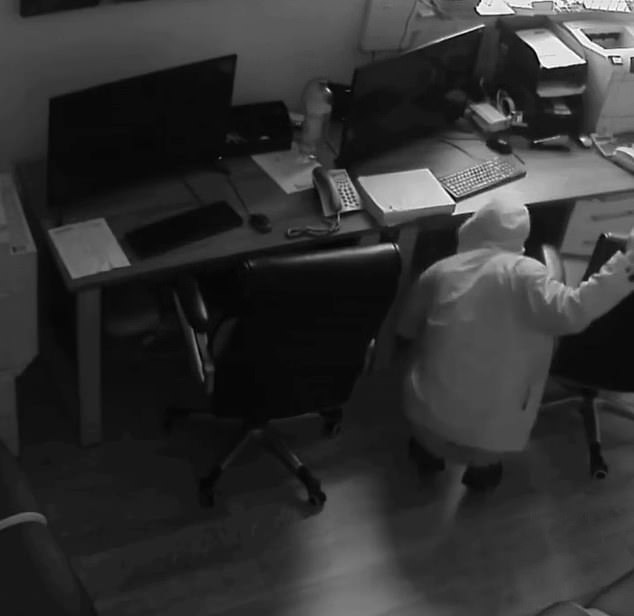
Ziaed was caught on CCTV removing two computers from the office while police raided his nephew’s home.
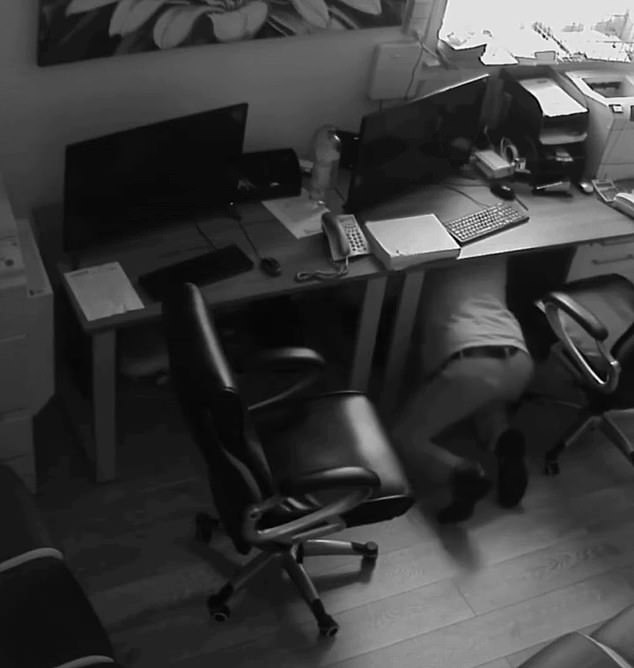
Ziaed Rauf unsuccessfully tried to block a CCTV camera and fled
Their scam was uncovered when financial investigators discovered that he e claimed to have earned £27,366 from 2016 to 2020 despite pocketing more than £61,000 from the insurance fraud alone.
When questioned by police, his son told officers he could not remember being given money by his father and claimed he did not know what it was for.
The three men appeared at Leicester Crown Court on Friday, June 6.
Ilyas Rauf, 51, of Normanton Road, Highfields, Leicester, pleaded guilty to fraud by false representation, breaching the Financial Services and Markets Act and transferring criminal property and was jailed for 21 months.
Amer Ilyas, 28, also of Normanton Road, pleaded guilty to money laundering offences and was given 16 weeks imprisonment, suspended for 12 months. He was also ordered to complete 100 hours of unpaid work.
Ziaed Rauf, 47, of Thurnview Road, Evington, Leicester, was given 18 weeks imprisonment, suspended for 12 months, and was ordered to complete 120 hours of unpaid work after pleading guilty to perverting the course of justice.
The latest figures from the Association of British Insurers (ABI) show the price of the average car insurance policy in January to March 2025 was £589, a 6 per cent drop from the year before.
However, premiums remain more expensive today than two years ago, with the average policy £478 in January to March 2023 – 23 per cent less than the first quarter of 2025.
A total of 35,434 reports were made to the fraud and cyber crime reporting service in 2024, compared with 22,530 in 2023.
Hacking methods include fraudsters gaining control of an account and impersonating the owner to convince others to reveal authentication codes.

The scams, known as ‘ghost broking’ are often advertised on social media, promising cheap quotes for a car insurance policy.
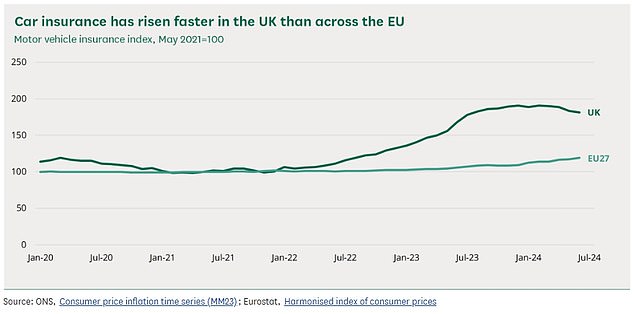
Car insurance policies have dropped over the last year, but are still remain historically high
Many victims believe they are being messaged by a friend.
The most common motives for social media hacking were investment fraud, ticket fraud or theft, Action Fraud said.
Fraudsters can also gain account details via phishing scams or data breaches.
People often use the same password across accounts, so when one is leaked several accounts are left vulnerable.
Action Fraud has launched a campaign, supported by Meta, to encourage people to take extra online protection by enabling two-step verification.
Victims often don’t realise they have been scammed until they try to claim on their policy or if they happen to be stopped by police and asked to show their insurance documents.
Karl Parr, Claims Technical Director, AXA UK, told MailOnline: ‘Ghost brokers typically offer premium prices far cheaper than customers can find elsewhere.
‘Remember, if something sounds too good to be true, it almost certainly is.’
Young driver Wayne Simpson bought a cheap car insurance policy on social media before realising it was fake after he was unable to claim following a crash, landing him with a loss of £500.
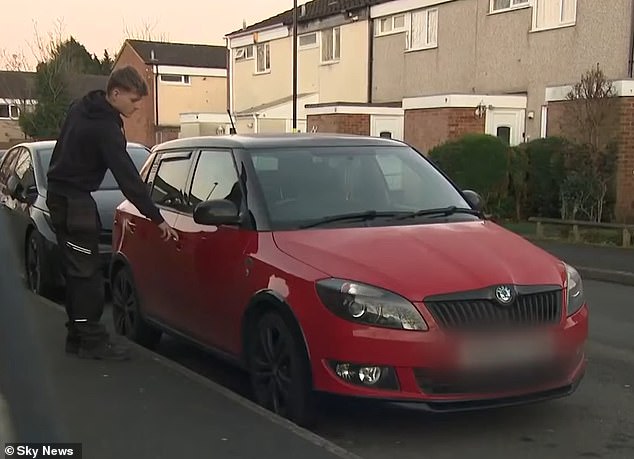
Young driver Wayne Simpson bought a cheap car insurance policy on social media before realising it was fake after he was unable to claim following a crash, landing him with a loss of £500
‘We called up Aviva and they told me there wasn’t a policy taken out in my name and that the number we had given them was not a number they would use,’ he told Sky News.
‘That’s when the dust settles, and you realise it’s been a scam.’
Mr Simpson said the insurance documents looked so real that they managed to fool a police officer at the scene of the crash.
‘She said, ”Your car’s not popping up as insured”. Straight away I went to my glove box, pulled the insurance documents, showed her the documents and she read through it and said, ”That’s totally fine”,’ he said.











